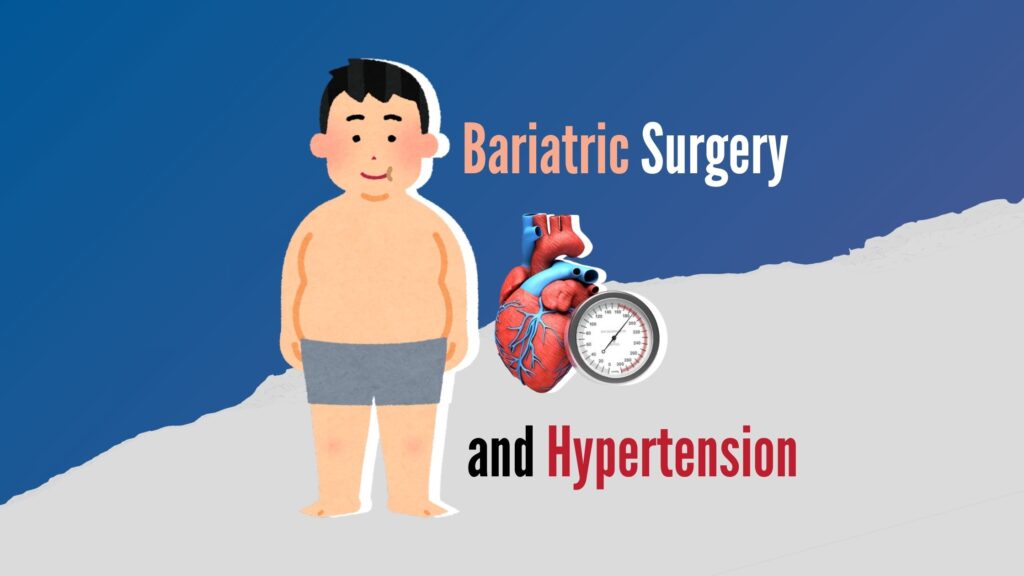Bariatric Surgery and Hypertension

Procedure of Gastric Bypass -
Gastric bypass surgery is a form of weight reduction surgery that helps people with extreme obesity in losing a large amount of weight over the long term of time . It is also commonly referred to as Roux-en-Y gastric bypass surgery .
Hypertension – Hypertension , sometimes referred to as high blood pressure , is a frequent medical disorder. When the blood’s constant pressure against the artery walls is too high. The pressure when the heart contracts and pumps blood, is called systolic pressure and the pressure when the heart is at rest in between beats, or diastolic pressure are the two measures that are used to calculate blood pressure. The normal range for normal blood pressure is 120/80 mmHg or less.
Bariatric surgery is performed when the individual’s BMI is more than 30 or if the individual has metabolic problems such as diabetes , heart disease , hypertension .Weight loss surgery is the other name for it. There are different types of Bariatric Surgery but commonly performed are laparoscopic sleeve gastrectomy, mini gastric bypass, and gastric bypass surgery.
Through a variety of intricate, interrelated pathways bariatric surgery influences
Hypertension . The following listed are a few crucial mechanisms:
Weight reduction: Post bariatric surgery there is a decrease in weight is caused which is essential in lowering blood pressure. Problems like greater blood volume, greater cardiac output, and higher peripheral resistance are all linked to excess weight and eventually raise blood pressure. The heart’s strain is reduced by losing a significant amount of weight which further improves blood pressure regulation.
Insulin sensitivity: Operations especially like gastric bypass surgery have been demonstrated to improve insulin sensitivity and glucose metabolism. Insulin resistance and high insulin levels are frequently linked to hypertension . Bariatric surgery indirectly lowers blood pressure by improving insulin sensitivity and glucose management.
Inflammation and oxidative stress : Chronic low-grade inflammation and elevated oxidative stress, both are associated with obesity and have a role in the emergence and development of hypertension. It has been demonstrated that weight loss surgery lowers the body’s levels of oxidative stress and inflammatory indicators. Because of the decrease in oxidative stress and inflammation blood pressure can be managed well .
Renal factors: Renal performance can be enhanced and Salt reabsorption in the kidneys can be reduced post Weight loss surgery . The kidneys play a major role in the control of blood pressure by maintaining fluid balance and salt excretion .Bariatric surgery can reduce blood volume, which in turn lowers blood pressure through enhancing renal function and salt management.
Impact of Bariatric Surgery on Hypertension
There are profound effects of bariatric surgery on hypertension (high blood pressure). In reality, one of the positive outcomes of bariatric surgery is improving or curing hypertension in many people. The following are some crucial considerations about how bariatric surgery affects hypertension:
Blood pressure reduction: There is a considerable drop in the blood pressure in those patients with hypertension post bariatric surgery .Research has revealed that many individuals significantly lower their systolic and diastolic blood pressure after surgery.
Reduced need for antihypertensive drugs: As weight is lost following bariatric surgery, blood pressure frequently becomes better to the point where antihypertensive drugs can be scaled back or even stopped. Most of the individuals might be able to control their blood pressure without using medication.
An improvement in cardiovascular health– One of the major risk factors for stroke and heart disease is hypertension . Bariatric surgery can enhance overall cardiovascular health and lessen the risk of these illnesses by successfully decreasing blood pressure.
Resolution of obesity-related conditions: In addition to helping patients lose weight, bariatric surgery also improves or cures a number of illnesses associated with obesity, including diabetes, sleep apnea, and metabolic syndrome. These disorders frequently co-exist with hypertension, and addressing them and finding an appropriate solution for these problems can help regulate blood pressure levels.
Benefits for vascular health: Bariatric surgery can enhance vascular performance and lessen inflammation, which are elements that might fuel hypertension. Blood pressure can be controlled because of these advancements in vascular health.
If you have hypertension and are thinking about having the surgical procedure it’s very essential to consult with a health care provider that specialises in bariatric surgery. They may assess your particular circumstance, go over how it can affect your blood pressure, and provide tailored suggestions based on your unique requirements.
Aastha Bariatrics offers a thorough approach to bariatric surgery as a centre of expertise. It is a well-known facility with a focus on metabolic and bariatric surgery. The foremost metabolic and bariatric surgeon is Dr. Manish Motwani. Aastha Bariatrics provides a group of medical specialists that cooperate with patients to help them meet their weight reduction and health objectives.
Read also; The Cost of Bariatric Surgery in India
Why We Are?
- Asia's Trusted Bariatric Center
- Centre of Excellence
- Patient Trusted Highly Volume Bariatric Center in Mumbai
- EMI, Cashless & Mediclaim Facilities are Available
- Daily Patients Follow-up after Bariatric Surgery
- Patient Support Group Every Month
- Obesity Awareness Program
- Available with Latest Technologies
- 18+ Experience in Weight Loss Bariatric Surgery
- 300+ Weight Loss Diet Plan & Recipes
- Highly Trained & Experienced Bariatric Nutritionist
- Patient WhatsApp Chat Group
- & Many More
Medically reviewed by Dr. Manish Motwani, Bariatric & Metabolic Laparoscopic Bariatric Surgeon — Curated by Mishitha





